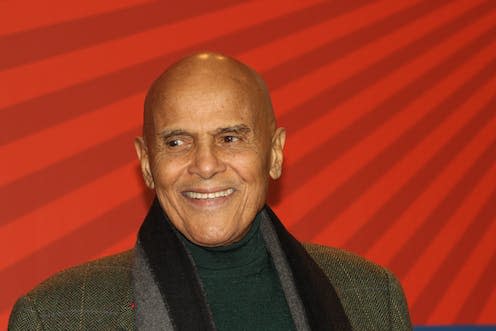Harry Belafonte: a singer and actor but an activist at heart

The Caribbean-American singer and actor Harry Belafonte has passed away from congestive heart failure at the age of 96. Although he was well known for songs like Day-O (The Banana Boat song) and Jump In The Line, which earned him the title “King of Calypso”, his music was a vehicle for much more.
Belafonte led a life of tireless activism and was present at the many peaks of 20th-century civil and human rights struggles across the globe. Reflecting on his stardom, Belafonte said:
My activism always existed. My art gave me the platform to do something about the activism.
Born 1927 in New York, he spent some years in Jamaica before returning to the US to enrol in high school. He then had a short stint in the navy before pursuing a career in the arts.
Inspired by Paul Robeson, another singer and actor and titanic figure in the history of the struggle for Black liberation, Belafonte became a singer and then an actor. His first big break was in Bright Road (1953) starring opposite Dorothy Dandridge.
Though he skyrocketed to success and was quickly vying for leading man roles with Sidney Poitier, Belafonte chose to step back from Hollywood stardom from 1959 to 1970.
He recounted that decade as an era of film that lagged far behind reality in terms of racial matters. Protests were erupting across the US and yet Black actors were still reduced to portraying hollow characters whose race was their main characteristic.
Director Elvis Mitchell stated that Belafonte’s deliberate retreat made him the “Muhammad Ali of the film world” – resisting untold fame and fortune to avoid sacrificing his principles.
Civil rights
With acting on the backburner, Belafonte turned his attention towards agitating for social justice. He became an ardent activist standing alongside Martin Luther King and others to protest for social, political and economic equality in America.
Belafonte integrated himself into a generation of Black artists like Ruby Dee, Ossie Davis and Frederick O’Neal, who similarly committed themselves and their platforms to help publicise and elevate grassroots activism. He participated in organising the 1963 March on Washington and financially backed the Student Non-violent Coordinating Committee.
With such close connections to civil rights activism, Belafonte saw the ups, downs and tragedies of such work. At one point, Martin Luther King was perturbed and confided in Belafonte: “I have come to believe that we are integrating into a burning house.”
Soon after this revelation King was dead.
Enduring through the pain of losing a close friend and mentor, Belafonte remained dedicated to the cause. He not only supported the King family by covering babysitting fees, but continued to support Black activism and expanded into international work.
Like many Black political activists, he spoke out against South African apartheid and also used his industry connections to organise 1985’s charity single We Are The World. For this, he was lovingly celebrated by the musicians featured in a group recital of his hit song Day-O. This clip remains a beautiful reminder of the respect and admiration Belafonte cultivated among his peers.
A global outlook
By the 2000s, although in his 70s, he remained stalwart in his efforts to support numerous campaigns for liberation across the world.
He lauded the socialist successes of Venezuela’s Hugo Chavez and Cuba’s Fidel Castro. He also denounced the neo-colonial efforts of leaders like George W. Bush.
In the last decade, Belafonte continued to attend talks and events concerning progressive politics. In 2016, he spoke at an evening with Democracy Now! where he stated:
When they started the purge against communism in this country and against the voice of those who saw hope in a design for socialist theory, and for the sharing of wealth, and for the equality of humankind, when we abandoned our vision and visuals on that topic … I think we sold out ourselves.
He also continued to appear on screen. He featured in Spike Lee’s Black KKKlansman in 2018 and Is That Black Enough For You? in 2022.
Just two weeks before he died, Belafonte celebrated how he had been inspired by Paul Robeson at the 125th anniversary of his birth.
Time and again, Belafonte invoked the sentiments of the late Robeson stating that “art is the radical voice of civilization”. With his voice and his actions, Belafonte was led by his “rebellious heart” to influence and help shape the lives of many. His legacy and his message lives on in all of those who embrace their own rebel hearts and commit themselves to building a fairer, more just, and more equitable world for all.
This article is republished from The Conversation under a Creative Commons license. Read the original article.

Tionne Alliyah Parris does not work for, consult, own shares in or receive funding from any company or organisation that would benefit from this article, and has disclosed no relevant affiliations beyond their academic appointment.

 Yahoo Sports
Yahoo Sports 